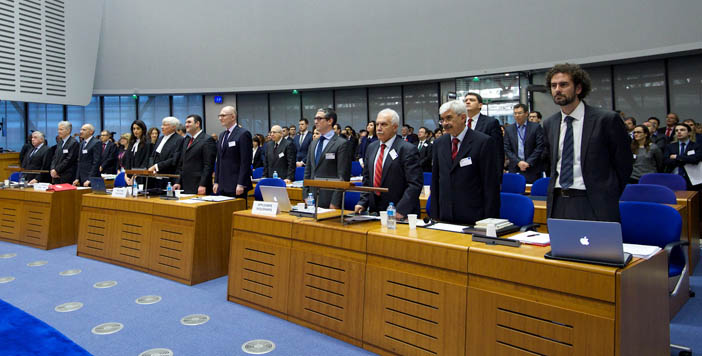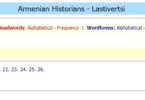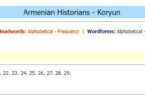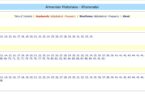What to make of the Perinçek decision:
A limited victory for Armenia, loss for humanity, shame for the ECHR
Tom Samuelian
A deeply divided Grand Chamber of the European Court of Human Rights recently rendered judgment in a decision that answered many questions, but avoided the bigger issue. For many informed observers, it was the dissent that got it right: two more votes (out of 17) would have made this a landmark case by taking judicial notice of the Armenian Genocide as a “self-evident” fact. We do not know what happened in chambers as the judges deliberated, but from the wording of the dissent, it seems that there was some last-minute maneuvering. Still, from an Armenian perspective, even the majority position is an improvement over the earlier decision, which it overruled. However, there are some points that should trouble supporters of the rule of law and defenders of human rights, in particular, the majority’s myopic rationale and their mischaracterization of Perinçek, his motives, and malicious statements.
It is important to remember that Armenia was not originally a party to this case and that Armenian genocide recognition was not a question before the court. This was ostensibly a freedom of speech case between Turkish ideologue Doğu Perinçek and Switzerland. However when the court in the earlier decision misguidedly addressed the issue of Armenian Genocide recognition, it acted in a way prejudicial to Armenian interests. Thus Armenia intervened in this final hearing. The statements of Armenia’s counsel, Geoffrey Robertson and Amal Clooney, as well as Armenian Prosecutor General Gevorg Kostanyan, give a good summary of the case and its impact from the point of view of Armenia as an intervenor. The Armenian Government won on all points it raised, and the court reversed the parts of the lower judgment that were prejudicial to Armenian interests. The court also upheld the right of a sovereign state to determine as a local policy matter whether genocide denial can be regulated and punished by law. So Switzerland and the legislatures of Europe won as well on the principle that restriction of genocide denial is a permissible limitation on freedom of speech.
Although it is a long opinion, in the end, the majority rested its decision on the narrow grounds that the law was applied in a way that violated Perinçek’s free speech rights, which is a quite different from saying that what he said is true or approved by the court. While acknowledging that Perinçek’s statements are offensive to Armenians (oddly, the majority doesn’t say why the Swiss or Europeans or other honest people around the world also should not be offended), the majority said Perinçek’s speech had to be tolerated under the circumstances, at least in Switzerland where the risk of anti-Armenian persecution or prejudice or violence or disruption to the public order is minimal. This is a very delicate jurisprudential balancing act even in the best of circumstances.
As the seven dissenting judges in the joint dissent state quite forcefully, without actually ruling on whether what happened to the Armenians was a genocide, the majority could have simply taken judicial notice of the Armenian Genocide as an accepted historical fact and ended the trivialization of the Armenian Genocide, clearing the way for Turkish atonement, and the healing of this wound on humanity, as Pope Francis characterized it earlier this year. This was the opportunity missed by the ECHR majority that lacked the courage to act in the interests of humanity, and unfortunately, humanity will continue to pay for this “timidity,” to use the dissent’s characterization of the majority.
The court claims judicial restraint, but from the tone of the dissent it appears that there may have been a majority (9 votes) for taking judicial notice of the Armenian Genocide, but that support eroded due to the politicization of the court (note Turkish Constitutional Court president’s visit to Strasbourg prior to the decision’s release), not to mention the upcoming Turkish elections, Europeans fear of the flood of refugees, the current geopolitical mess in Syria, ISIS, and the precedent of recognizing the Armenian Genocide and its consequences after a century of obfuscation. The majority’s posture of judicial restraint provides easy cover for these extraneous factors.
The dissent invoking the erga omnes doctrine lambasts the majority opinion for sending the wrong message and abandoning its duty to uphold the universality of human rights. Man’s inhumanity to man is not something to be trivialized or treated with contempt. One does not need to be a black South African or to be in South Africa to be offended when apartheid is justified or praised. It is not just Armenian dignity and a sense of truth that are violated when Perinçek calls the Armenian Genocide an international lie. Swiss and Europeans generally, not to mention the rest of the world, should be offended as Perinçek was contemptuously flaunting Turkish impunity for the state-planned extermination and expulsion of the Armenians from their indigenous homeland, a fact about which there is no dispute.
The court’s myopic ruling is a threat to world peace and mutual respect among nations. People internalize norms of behavior based on actions of courts. If the European Court trivializes the Turkish inhumane treatment of the Armenians, while the fruits of these acts continue to be enjoyed to this day with impunity, then the lesson for today’s ISIS jihadists and others is genocide pays, the de facto international norm is impunity, and the European Court now says it is all right to brazenly deny wrongdoing afterward.
From the point of view of humanity and law, the Perinçek decision is sad, yet from an Armenian perspective it is still a step forward toward full genocide recognition: no ECHR judge found that Armenian Genocide denial is “true, hence permissible” free speech, and 7 of 17 judges of the highest court in Europe treat the Armenian genocide as a “self-evident” fact. Certainly it would have been better if it had been 9 out of 17 judges, but the issue of Armenian Genocide recognition was not before the court. Had it been before this or another court, it is quite likely that the Armenian Genocide would be ruled an incontrovertible legal fact. Turkey should be shaking in its boots. The tide has turned on the denialist maneuver.
Tom Samuelian is an international attorney from Yerevan.







